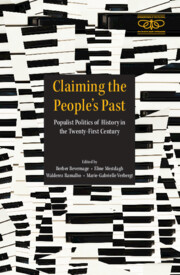Book contents
5 - Memory, History, and the Politics of the Hindu Right
Published online by Cambridge University Press: 15 May 2024
Summary
Introduction
If, in writing history, we constitute the past and structure collective imagination, then the specific way we narrate the past becomes important in defining the shape of the national memory we produce and the vision of the nation that comes into being. This chapter looks at the way the Hindu right in India frames its history and envisions the nation. It suggests that we not only unpack the framing tropes of that historical imagination, but also the practices that reflect its attitude to the craft of history writing and the place of the historical profession within society. Populist regimes everywhere seek to refigure what counts as history.*
The internal dynamics of the Hindu right have always been shaped by a contradictory dialectic between constitutional politics and extra-constitutional activism, between the seemingly moderate and the aggressively militant voices. This conflict has unfolded differently over the decades. Through the 1950s and 1960s, the Hindu right could not expand its electoral base, though it continued its work at the popular level, opening schools where Hindutva history and Hindutva culture were popularised, doing social work, forming cultural and social organizations that were committed to the ideals of Hindutva. Even as late as 1984, the Bharatiya Janata Party (BJP) was not able to win more than two parliamentary seats. Disappointed with electoral politics, desperate to expand its social base, many within the Hindu right felt the need for a militant movement to forge an aggressive Hindu identity. L. K. Advani emerged as the aggressive face of the right – leading the Ram Janmabhoomi movement in the late 1980s to build a temple for Rama, a major Hindu deity, in Ayodhya – and Atal Bihari Vajpayee appeared as the moderate voice. While Advani's efforts helped forge an assertive masculine Hindu identity, Vajpayee managed to form a coalition government in 1996.
In the early years of this century, during the time that Vajpayee was managing an embattled central coalition, Narendra Modi was fine-tuning a new militant Hindutva in Gujarat as the chief minister of the province. By 2014 he appeared as the unchallenged populist right-wing leader of India.
- Type
- Chapter
- Information
- Claiming the People's PastPopulist Politics of History in the Twenty-First Century, pp. 99 - 120Publisher: Cambridge University PressPrint publication year: 2024



